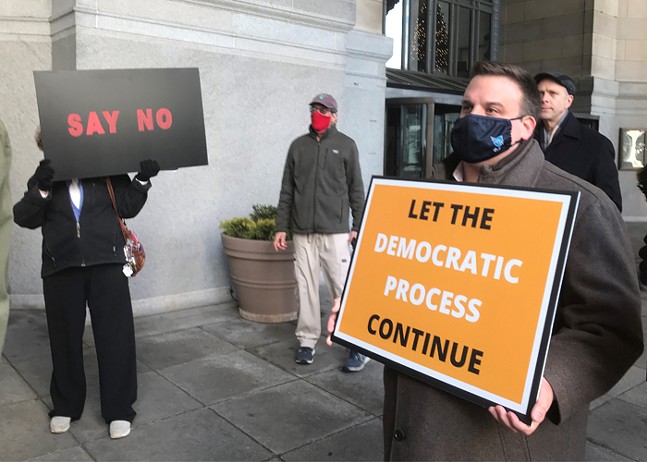
CP Photo: Jordana Rosenfeld
A supporter and an opponent of the Wilkinsburg-Pittsburgh merger listen during a rally in Downtown Pittsburgh on Jan. 5.
“We all want Wilkinsburg to grow,” said Tracey Evans, the executive director of Wilkinsburg Community Development Corporation, the nonprofit that’s been driving pro-merger efforts. She lamented that “what we have been doing isn’t working,” citing population loss, growing blight, and lack of private investment in Wilkinsburg.
“It is clear that even with outside help, the borough [alone] does not have the capacity to reverse its decline,” Evans said.
Most who attended the rally at the City-County Building in Downtown Pittsburgh were supporters of the merger, but the event drew about 10 vocal protesters with signs saying “WCDC doesn’t rep us,” “Say no to annexation,” and “Keep Wilkinsburg Wilkinsburg.”
About 25 people gathered in front of the City-County Building to listen to the pro-annexation speakers including Evans, Allegheny County Executive Rich Fitzgerald, former Wilkinsburg Councilor Michael Rose, Pittsburgh City Councilor Anthony Coghill, President of the Pittsburgh Fire Fighters IAFF Local No. 1 Ralph Sicuro, Wilkinsburg Firefighter Brian Trovato, and business owner Derrick Tillman. Pittsburgh Controller Michael Lamb had planned to attend prior to testing positive for COVID-19 and issued a short statement in support of the merger.
“I heard a detractor of the merger describe Wilkinsburg as a diamond in the rough,” said former Wilkinsburg Councilor Michael Rose. “Well, it is. It's been rough long enough. It’s time to polish it.”
According to a release from rally organizers, earlier this year “more than 1,200 Wilkinsburg residents,” about twice the number legally required, “signed a petition asking to be fully merged with Pittsburgh after successful fire and refuse mergers.” Merger proponents then submitted their petition signatures to Common Pleas Judge Joseph James for validation, which he gave later in the afternoon.
Following a little-used or known 1903 Pennsylvania law on annexation, the proposed merger requires Pittsburgh City Council to vote in its favor in order to trigger a referendum for Wilkinsburg residents, who will have the final say. Organizers framed the rally as one in support of Wilkinsburgers’ “right to vote” on this issue.
Both Wilkinsburg and the city of Pittsburgh face serious challenges that proponents say the merger could alleviate.
Pittsburgh’s population is shrinking. According to the 2020 census, the city’s population is 302,971. Some city leaders, like Lamb, worry that its ability to garner necessary resources could diminish should the city dip below 300,000 residents. Wilkinsburg, with its approximately 15,000 residents, could provide the city’s population numbers with a substantial boost.
Merger proponents also point out that Wilkinsburg’s population has shrunk at a much faster rate than that of nearby municipalities, including the city. The city of Pittsburgh also already provides many services to Wilkinsburg residents, including fire services and trash collection. The only municipal service Wilkinsburg provides to its residents is its own police department.
Merger opponents say they’d rather be part of a smaller community that’s self-governed, citing their disapproval of Pittsburgh Public Schools’ slow response to the pandemic.
Wilkinsburg’s property taxes are very high. Several speakers, including Fitzgerald, decried Wilkinsburg’s notably high tax millage rate. Pittsburgh Councilor Coghill went as far as to argue that it is “virtually impossible to bring development to downtown Wilkinsburg at this point,” because of high property taxes.
“A merger would immediately equalize Wilkinsburg's tax rate with the City's,” a release from rally organizers reads.
While it is true that annexation would mean much lower property taxes due to Pittsburgh Public Schools’ lower millage rate, PublicSource reported in an analysis of the merger’s tax implications that renters, in particular, may see higher taxes after the merger. While property taxes will go down, it’s likely income and deed transfer taxes would go up.
As Rose touted the financial programs Wilkinsburg residents would be able to access with a merger — including closing cost and down-payment assistance and Pittsburgh’s Small Landlord Fund — protesters shouted their disapproval. Tensions remained high between the anti-merger protesters and pro-merger speakers throughout the rally. Rose challenged those who disagreed with him to offer their own plan.
“To Wilkinsburg leaders, both elected and unelected, I ask and implore you. This is an uncertain time on many fronts,” said Rose. “Show us the way! And if you can't show us the way, then forgive us for forging our own back to the city.”
Some Wilkinsburg residents, like 20-year-old Jocelyn Hinton, attended the rally in protest and said they don’t trust WCDC to look out for their best interests and that the organization is out of touch with what residents want. She told City Paper she sees Wilkinsburg Borough Council as the true community representatives.
Coghill asked residents to “hold your emotions aside and look at it from a business perspective." He called the merger a “win-win,” eliciting vocal objection from counter protesters.
“We vote no!” shouted a protestor.
“Vote in the voting booth!” replied a merger supporter standing in front of him.
Now that Judge James has validated the petition signatures, Pittsburgh City Council has 90 days to vote on it. If a majority of councilors are in favor of the petition, Wilkinsburg residents will vote on annexation in a referendum later this year. It is currently unclear if there are enough merger supporters on Pittsburgh City Council to approve the petition.

